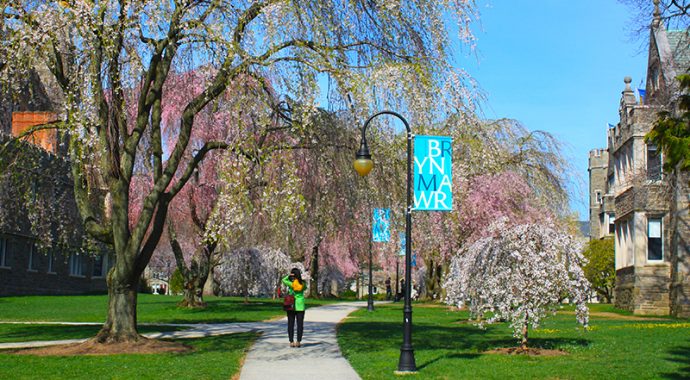
By Elizabeth LaScala, PhD
Bryn Mawr College is one of the five Seven Sisters women’s colleges that has remained all-female for undergraduate education. Close to Philadelphia, Bryn Mawr has one of the most beautiful campuses in the nation sporting a blend of modern and Gothic style architecture, much like one would find at Duke and Princeton. The main assembly room will remind you of the dining room at mythical Hogwarts in the Harry Potter series. Downtown Bryn Mawr has a nice college town vibe with a restored movie theater, coffee shops and several ethnic and theme restaurants; and it takes less than 30 minutes to get from town and campus to Center City Philadelphia via the SEPTA rail line.
Bryn Mawr offers 37 majors, 47 minors, and four concentrations. Distinctive majors include Classical and Near Eastern Archeology, Greek, Latin, and Classical Studies, and Growth and Structure of Cities. Concentrations include multi-disciplinary opportunities such as Geoarchaeology, Latin American Studies, Middle East Studies and Conflict and Social Justice. Bryn Mawr also offers unique minors including Computational Methods, Education and Health Studies.
Bryn Mawr does not admit students to a major, nor does it “cap” enrollment on popular majors. However, sophomores must submit a Sophomore Plan that indicates their intended major, the courses they plan to take, along with possible electives. They also meet with staff in the College’s Leadership, Innovation and Liberal Arts Center (LILAC) to discuss possible career directions. Ninety percent of a first-year class returns to prepare a Sophomore Plan. Approximately 80 percent of the women who start at Bryn Mawr graduate in four years. Bryn Mawr students, aka “Mawrters,” may also dine, take classes, and attend events at Haverford College, Swarthmore College, and UPenn. Mawrters are most likely to take some classes at Haverford, the easiest campus to reach by bus and vice versa.
Nearly all Bryn Mawr undergrads live on campus. The community bonds around traditions including Lantern Night, May Day and more, all based around residence life. Bryn Mawr mixes first-year students and upper-class students in the halls. Dorm Leadership teams include paid Hall Advisors (juniors or seniors), volunteer Customs Persons (usually sophomores), a Community Diversity Assistant and Peer
Mentors. Hall Advisors organize programming on their floors with the student-elected Dorm Presidents. Working in pairs Customs Persons mentor first-year students to help them get settled.
Bryn Mawr has a unique student government called the Self-Government Association. It places students in the position of proposing and recommending changes to campus life policies as well as enabling them to vote and help enforce them. The Association also provides a voice to ask the college to define “gender” in its admissions policies. As a result, the college’s board voted to admit trans-gender students who identify as female in 2015. The association also administers Bryn Mawr’s Honor Code which covers academic honesty, including self-scheduled exams as well as social interactions.
Bryn Mawr attracts intellectually mature women who will graduate with a tight circle of friends. There is no such thing as a “typical Bryn Mawr student.” The best way to know if Bryn Mawr is the right fit for you is to visit and spend time among the Mawrters.
Private: 1,409 undergraduates,
333 graduate students;
31% acceptance rate;
mid-SAT: RW 660-750, M 620-750; mid-ACT: 29-35;
14% International, 32% Diversity, 88% Out of State; Student-Faculty: 8 to 1



